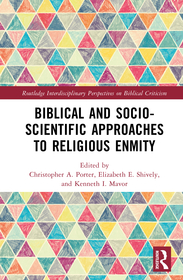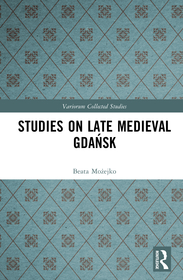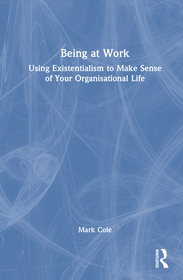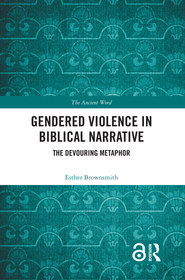
Biblical and Socio-Scientific Approaches to Religious Enmity
Series: Routledge Interdisciplinary Perspectives on Biblical Criticism;
- Publisher's listprice GBP 145.00
-
69 273 Ft (65 975 Ft + 5% VAT)
The price is estimated because at the time of ordering we do not know what conversion rates will apply to HUF / product currency when the book arrives. In case HUF is weaker, the price increases slightly, in case HUF is stronger, the price goes lower slightly.
- Discount 10% (cc. 6 927 Ft off)
- Discounted price 62 346 Ft (59 378 Ft + 5% VAT)
Subcribe now and take benefit of a favourable price.
Subscribe
69 273 Ft

Availability
Not yet published.
Why don't you give exact delivery time?
Delivery time is estimated on our previous experiences. We give estimations only, because we order from outside Hungary, and the delivery time mainly depends on how quickly the publisher supplies the book. Faster or slower deliveries both happen, but we do our best to supply as quickly as possible.
Product details:
- Edition number 1
- Publisher Routledge
- Date of Publication 30 December 2025
- ISBN 9781032719894
- Binding Hardback
- No. of pages240 pages
- Size 234x156 mm
- Language English
- Illustrations 1 Illustrations, black & white; 1 Halftones, black & white 700
Categories
Short description:
This book examines how Christian teachings on love and enmity shape group identity and conflict, with scripture and theology used both to justify violence and call for reconciliation. It explores interdisciplinary perspectives that combine socio-scientific approaches with biblical criticism.
MoreLong description:
This book examines how Christian teachings on love and enmity shape group identity and conflict, with scripture and theology used both to justify violence and call for reconciliation. It explores interdisciplinary perspectives that combine socio-scientific approaches with biblical criticism.
By exploring historical, biblical, and contemporary examples, this volume illuminates how religious identity influences the construction of enemies and offers tools for critically engaging with faith-based conflict. Drawing on Social Identity Theory, theological analysis, and interdisciplinary research, the book provides a framework for rethinking community engagement across difference. The contributors examine how Christianity metabolizes neighbor-enemy distinctions, addressing the contemporary re-emergence of sharp divisions despite increased global engagement. The chapters leverage insights from psychology, sociology, anthropology, literary criticism, historical analysis, reception history, and classical studies to understand how group self-identification generates both external conflict and internal conformity. This comprehensive approach helps readers understand the seeming intractability of religious enmity while offering pathways toward reconciliation and constructive dialogue in diverse religious contexts.
Biblical and Socio-Scientific Approaches to Religious Enmity is ideal for scholars, students, clergy, and readers in theology, biblical studies, religious ethics, and political theology who seek to understand the intersection of faith, social identity, and enmity. It serves academics exploring socio-cognitive approaches to religious conflict as well as practitioners working to address religious polarization in contemporary communities and interfaith contexts.
MoreTable of Contents:
Introduction; 1. Reflections from Social Identity Theory on Authoritarianism, Fundamentalism and Narratives of Nationalism and Multiculturalism: From Ezra/Nehemia/Ruth to the Postcolonial Era; 2. From Enmity to Empathy: Paul and (Re)-Defining the Boundaries of “Us-ness”; 3. Adjustments to Mirror Reading: Finding Opponents, or Just an Audience, from a Text; 4. Reconciliation and Joseph’s ‘Power Over’ His Brothers in Genesis 50:15-21; 5. Figuring a Leader: The Depiction of Abijah in 2 Chronicles 13 as Reinforcing Intra-Group Enmity; 6. Identity and Inclusion in Mark’s Gospel: The Case of Jesus and the Syrophoenician Woman (Mark 7:24-30); 7. Desertion or Exclusion: Relationships with the Outgroup in the Johannine Writings; 8. Staging Incest and Identifying the Enemy: Reading 1 Cor 5 in Light of the Black Sheep Effect and Ancient Theatre; 9. ‘They Do Not Keep The Law’ (Galatians 6:13): Forceful Circumcision and the Fruit of the Spirit; 10. Restoring the Enemy? Considering the Pauline Imperative of Galatians 6:1; 11. Borrowing from Peter to pay Paul: Middle Management and the mediation of theological and social capital; 12. Postcolonial perspectives on animosity and enemies in Paul; 13. Judaism, Judeo-phobia, and the Conversion of the Royal House of Adiabene; 14. Degradation ceremonies and the politics of the vaccine mandate: An ethnographic analysis of the Melbourne Construction Industry Protests, September 2021; Index.
More








